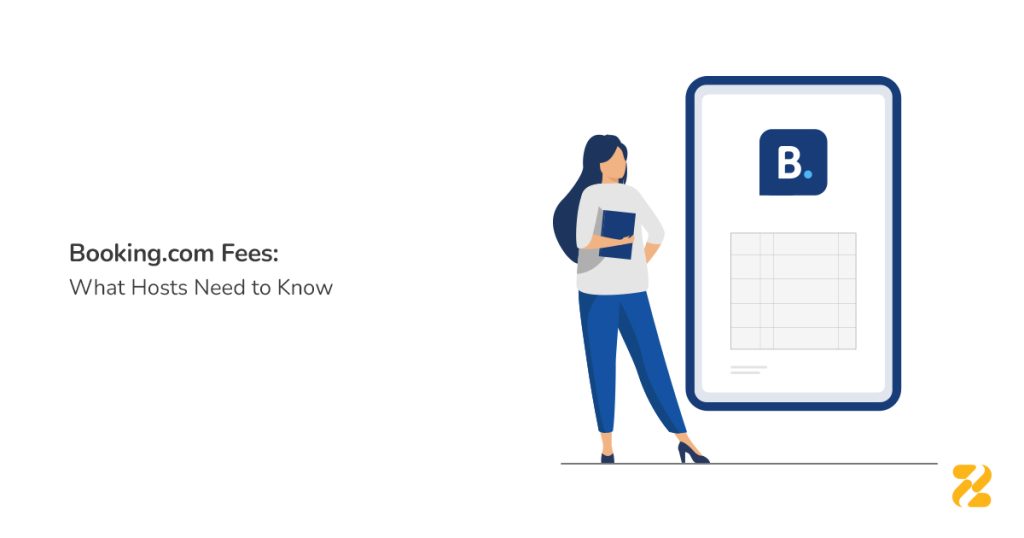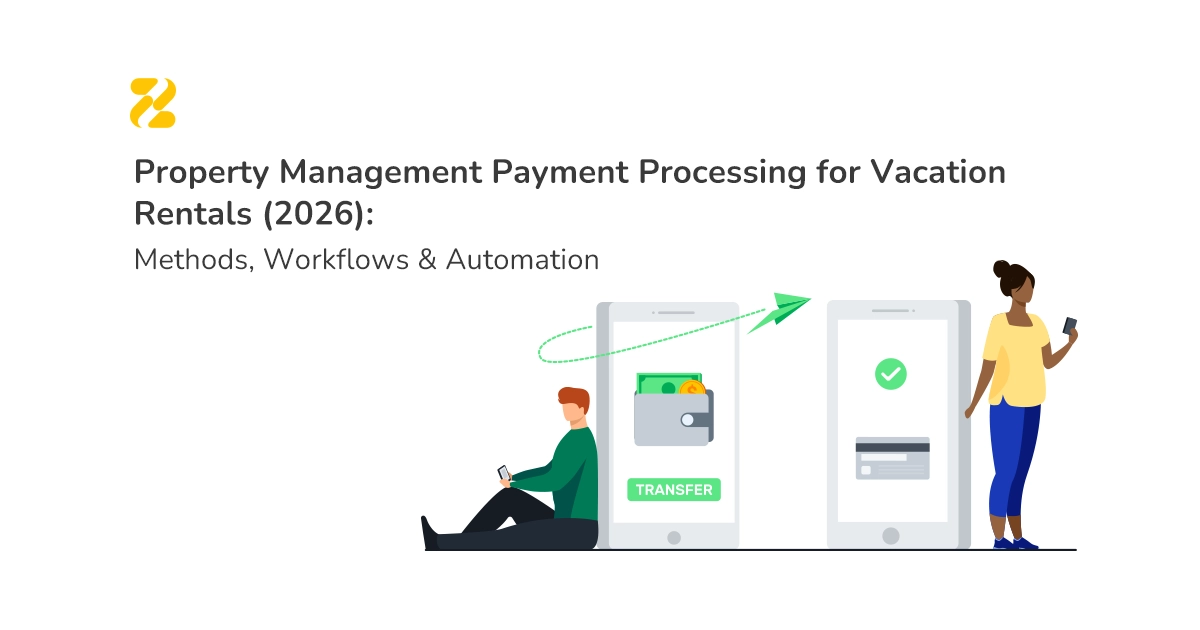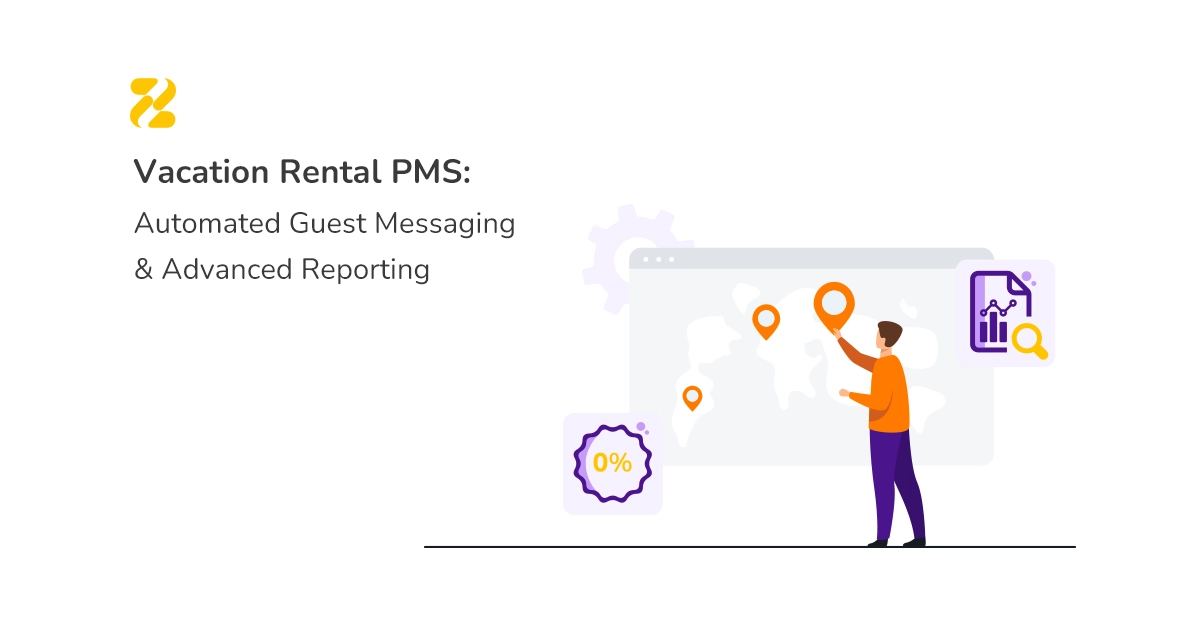Booking.com is a widely used online travel agency that connects travellers with a variety of accommodation providers. For property managers looking to list their properties on this platform, understanding the structure of Booking.com fees is crucial. This knowledge is key to effectively overseeing financial operations and devising strategic pricing plans.

Table of Contents
What Are Booking.com Fees for Hosts?

Commission Fees on Reservations
Booking.com commission fees for hosts is calculated as a percentage of the overall booking amount which encompasses the initial rate determined by the host along with any extra charges applied during the reservation process.
According to Booking.com, property hosts pay between 10% and 25% commission, with an average rate of 15%. It generally depends on your property’s location and the cancellation policy you have defined for your rental.
The hotel base fee is 15%, which can rise to 18% if the host uses Booking.com’s member service.
Tax Fees
Booking.com fees for hosts do not include local taxes, such as city tax. However, in most countries, they apply a commission fee to VAT/GST based on the applicable local tax laws.
Overbooking Fees
There won’t be any Booking.com host fees for a double booking under the following conditions:
- Your property has been listed on Booking.com for less than 30 days.
- You have experienced fewer than four double bookings within the past 12 months.
If these conditions are not met, you will incur a charge for the reservation.
The expenses differ from one situation to another. However, if you lack an alternative room or unit, you will be responsible for the cost of the new accommodation. Additionally, you might have to cover the costs involved in moving the guest to this new place.
Payment Processing Fees
Payments by Booking.com is a solution designed to handle guest payments through virtual credit cards or bank transfer. This service does not require a setup fee or additional commission. But, it charges a fee based on the payout method, the property’s location, and whether payment collection is managed entirely by Booking.com or partially by the property.
The fee structure covers various costs, such as payment processing, chargeback, fraud risk, and SCA where applicable. Fees differ for virtual credit card and bank transfer payouts, with additional payment service provider fees, network fees, and interchange fees potentially applying.
Moreover, it includes no charges for waived fees on free cancellations.

What Are Booking.com Fees for Guests?
Guests don’t need to pay any commissions to Booking.com. However, Booking.com allows property managers to charge extra fees for cleaning. And, they charge between 10% to 25% commissions to hosts for add-ons and cleaning fees.
Tips to Minimise Booking.com Host Fees
While you can’t avoid Booking.com fees entirely, there are a few strategies you can use to minimise them:
Optimise Your Cancellation Policy
Booking.com charges a higher commission for more flexible cancellation policies.
One effective strategy to counterbalance this is to introduce a non-refundable rate option for your listings. Offering a non-refundable rate typically attracts a lower Booking.com commission, which can improve your overall revenue. This rate plan can also deter last-minute cancellations, ensuring a more stable occupancy rate.
However, when implementing a non-refundable rate, it’s crucial to consider the impact on customer satisfaction and your brand’s reputation. Ensure that such a policy is clearly communicated to potential guests to avoid misunderstandings and potential disputes. Additionally, it’s important to align your cancellation policy with local consumer protection laws and regulations to avoid legal issues.
Consider the market dynamics and your target audience’s preferences. In some cases, offering flexibility, even with a higher commission cost, may attract more reservations and lead to higher overall revenue.

Promote Direct Bookings
Encourage guests to book directly through your direct booking website by offering exclusive discounts or incentives. This way, you can significantly reduce or eliminate the need to pay Booking.com host fees.
If you’re yet to set up a website for your vacation rental, Zeevou offers a free direct booking website to help you create one. With Zeevou’s Booking Engine integrated, your website will facilitate direct reservations by displaying live prices and availability. The website is SEO-friendly and has the potential to achieve high search engine rankings.
Be Mindful of Add-On Fees
Booking.com charges commissions on add-ons, such as cleaning fees and resort fees, that guests pay at the time of booking. You should be aware of these Booking.com host fees to efficiently manage your room rates and expenses.
To avoid Booking.com fees on services like breakfast, consider leveraging Zeevou’s Upsell feature. This allows guests to purchase extra services before completing the payment process. By adopting this strategy, you can effectively minimise Booking.com fees for hosts. You can also eliminate the need to create various rate plans to specify which services are included in each reservation.
Conclusion
Navigating Booking.com fees is essential for hosts looking to maximise their earnings and optimise their listings on this popular platform. By understanding how commissions and other charges are applied, hosts can make informed decisions about their pricing strategies and cancellation policies. Additionally, tools like Zeevou’s Direct Booking Website and Upsell feature can help avoid some of the fees associated with third-party bookings.
Ultimately, a comprehensive grasp of Booking.com host fees positions property managers to offer competitive rates and exceptional services, thereby attracting more guests and increasing occupancy rates.
Image by pch.vector on Freepik.




